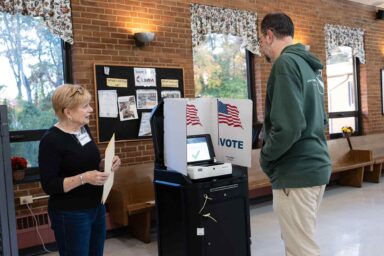An astonishing 70 percent of supporters of Donald Trump said they would only accept the outcome of the 2024 election if the former president prevailed.
|
Listen To This Story
|
An astonishing 70 percent of supporters of Donald Trump said they would only accept the outcome of the 2024 election if the former president prevailed, according to a new poll.
That figure is even higher than the two-thirds of Iowa Republicans who believe that President Joe Biden’s victory in 2020 was illegitimate.
It’s not difficult to see how this will end… because we already know. Egged on by Trump, who relentlessly (but without evidence) propagated the Big Lie that the 2020 election had been “stolen” from him, thousands of the former president’s supporters converged on Washington, DC, on January 6, 2021, and many of them ended up storming the Capitol to prevent the certification of Biden’s victory.
Since then, even more Republicans have embraced the Big Lie, which makes one wonder what they are willing to do this time around if Trump loses again.
All that being said, the poll, which the Canadian Angus Reid Institute released Thursday, also shows that nearly half of Democrats said they would only accept the outcome of the election if Biden won a second term.
We have come to expect these kinds of survey outcomes from GOP voters, but seeing 46 percent of Democrats saying the same thing is both surprising and disturbing. So far, they have not yet shown the same propensity for political violence on the scale of January 6, but the poll’s results cast doubt on whether that will remain the case.
Overall, the findings are a troubling sign for US democracy and an illustration of how deeply the country is divided along partisan lines.
The poll also shows that Americans of all stripes are deeply distrustful of the security of their elections (although likely for different reasons). A mere 18 percent of them are “absolutely confident” that the necessary measures have been taken to “to prevent widespread fraud and cheating in the 2024 election.”
An additional 24 percent of them are “more confident than not” that this will be the case.
It bears repeating that there is no evidence that this has occurred in the past.
Sure, Republicans, for example, have been trying to pass voter suppression measures, and there is no doubt that Russia tried to influence the outcome of the 2016 election in a way that favored Trump, but these problems do not rise to the level of “widespread fraud and cheating.”
The poll reaffirms how distrustful Americans from opposite ends of the political spectrum have grown of each other.
One area in which supporters of both parties agree is that democracy would be weakened if their respective candidate were to lose.
In light of these figures, it should come as no surprise that nearly half of them believe that the US is heading down a path toward authoritarianism. This, too, is a sentiment Democrats and Republicans share.
However, eroding trust in elections (and the distrust with which Americans of different political affiliations now view each other) is only part of the problem.
For example, voters also do not feel that the civil rights of all Americans are protected, and only 15 percent of them think that the rule of law applies equally to everyone.




